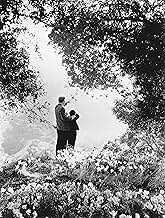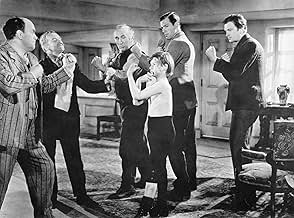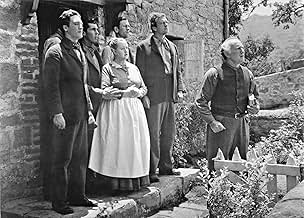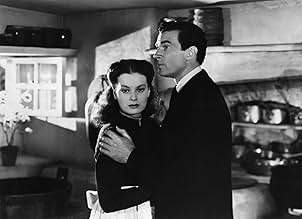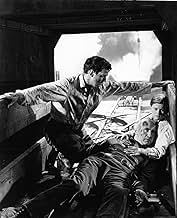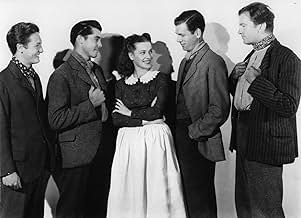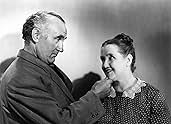A la fin du 19è siècle au Pays de Galles, la vie d'une famille de mineurs vue par plus le jeune des enfants, Huw: le travail difficile, les accidents, les peines, les joies, les combats, les... Tout lireA la fin du 19è siècle au Pays de Galles, la vie d'une famille de mineurs vue par plus le jeune des enfants, Huw: le travail difficile, les accidents, les peines, les joies, les combats, les renoncements, les espoirs pour Huw.A la fin du 19è siècle au Pays de Galles, la vie d'une famille de mineurs vue par plus le jeune des enfants, Huw: le travail difficile, les accidents, les peines, les joies, les combats, les renoncements, les espoirs pour Huw.
- Réalisation
- Scénario
- Casting principal
- Récompensé par 5 Oscars
- 19 victoires et 6 nominations au total
- Ceinwen
- (as Ann Todd)
Avis à la une
Walter Pigeon is the likable minister, and lead character, "Mr. Gruffydd." He's likable because he doesn't judge people as the head deacon does. The latter is portrayed ludicrously by Barry Fitzgerald, much to the delight of secular-minded film critics, who loved his performance. Nonetheless, there is a lot of "religion" pictured positively in this film, a lot of spiritual scenes and most were done well.
Roddy McDowell plays the most memorable character, I thought: "Huw," a young boy who went through some really tough times, as did most of the townsfolk.
If you are used to modern films, be warned this film does drag in spots. It is a fine movie, to be sure, and a powerful and emotional story.
There is not much, if anything, to criticize in this movie, it's one of the best ever.
8/10
Mr. Ford uses songs in most of his films. In this movie as well as in The Quiet Man, this device enhances what we are watching. The songs are diversions for the stark reality in the miners' lives. Their every day misery is somehow eased when they sing with clear voices ancient folk melodies they, and their forefathers, have always known.
The Morgan family is at the center of the story. We hear the narration from Huw, the youngest member of this family. All the men work in the mine; they are all disillusioned by the working conditions and meager wages that they give without hesitation to the matriarch when they are paid. They appear content at the beginning of the film, but we watch them gradually abandon their village in search of a better life; who can blame them?
The cast assembled by Mr. Ford is first rate. Donald Crisp, as the patriarch of the Morgan family outdoes himself in this film. Walter Pidgeon as the local church pastor is excellent. The young and radiant beauty of Maureen O'Hara was so powerful, we can't stop watching her for a moment when she is on screen. Roddy McDowall as the youngest child of the clan in his first appearance is also a magnetic presence that holds the viewer's attention all the time.
The rest of the actors do incredible ensemble work to support the principals. Anna Lee, John Loder, Barry Fitzgerald, Anne Todd make us believe they are the characters they are playing.
Ultimately this is a John Ford's triumph. He is the force that welds everything together and in spite of all the bad things that happen to the family and the town, he seems to be telling us there still is hope and life will continue.
But sometimes it seems too good to be true:the boss's offspring marrying a miner's daughter,even when she's a beauty like Maureen O'Hara?The boss asking the poor father's permission?We are far from Emile Zola's "Germinal" :both stories happen about during the same era ,both with the miners' life both are radically different.Zola's world is a bleak,desperate world ,his depiction of the families' houses and meals (when there is food) and the pictures of Ford's movie are worlds apart.But the biggest difference is the omnipresence of the Lord's will:in "how green" the minister is a cool young handsome man (Pidgeon),in "Germinal" ,the priest's only a silhouette,but a selfish cruel one,unconcerned to man's plight:Zola's miners do not put their trust in a God anymore .
Wales and the east of France ,were they that much different?You can only say they were novels and movies,and reality is probably somewhere between them.
Oscars Best Picture Winners, Ranked
Oscars Best Picture Winners, Ranked
Le saviez-vous
- AnecdotesHistorians have called the way the wind plays with O'Hara's veil when she leaves the church after her wedding a stroke of luck for John Ford. Far from it, he had instructed the crew to set up wind machines to fan the veil into a perfect circle behind her head then blow it straight up into the air.
- GaffesThe wage reduction proclamation contains the word "labor" (American spelling) rather than "labour" as any British Islander would spell it.
- Citations
Mr. Gruffydd: You've been lucky, Huw. Lucky to suffer and lucky to spend these weary months in bed. For so God has given you a chance to make the spirit within yourself. And as your father cleans his lamp to have good light, so keep clean your spirit... By prayer, Huw. And by prayer, I don't mean shouting, mumbling, and wallowing like a hog in religious sentiment. Prayer is only another name for good, clean, direct thinking. When you pray, think. Think well what you're saying. Make your thoughts into things that are solid. In that way, your prayer will have strength, and that strength will become a part of you, body, mind, and spirit.
- Versions alternativesOriginal stereophonic soundtrack recovered and restored for later video and cable TV release.
- ConnexionsEdited into Au coeur du temps: End of the World (1966)
- Bandes originalesRhyfelgyrch Gwyr Harlech
(uncredited)
(Men of Harlech)
Traditional Welsh folk song
Played and Sung during the opening credits
Meilleurs choix
Détails
Box-office
- Budget
- 1 250 000 $US (estimé)
- Montant brut mondial
- 865 $US
- Durée
- 1h 58min(118 min)
- Couleur
- Rapport de forme
- 1.37 : 1


